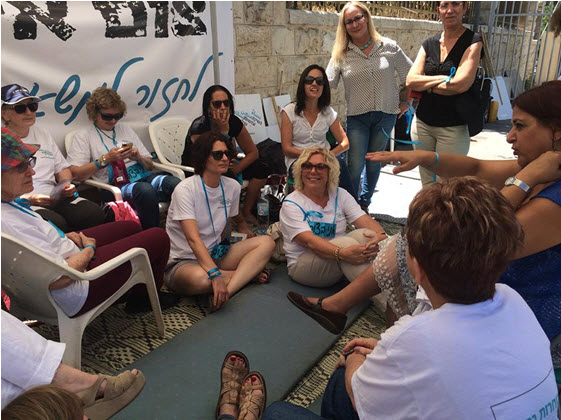At the entrance to the prime minister’s residence in Jerusalem, nearly 30 women are sitting on mattresses, surrounded by banners calling for peace negotiations. One of their shirts reads “Women waging peace and stopping the next war.” Some of them hold signs that read “Fasting.”

Activists from Women Wage Peace in the protest camp erected outside the prime minister’s residence in Jerusalem (Photo: Women Wage Peace)
On last Thursday, July 9, a year after the start of the deadly “Operation Protective Edge,” the Women Wage Peace movement set up a protest camp just outside the prime minister’s residence, calling on the government to resume negotiations with the Palestinians. The movement was established during last year’s Gaza war by Jewish and Arab women across the country. As part of their protest, the women will go on single-day fasts for the duration of 50 days, the length of last year’s war. The decision to fast stems from their desire to show solidarity with the pain and struggle of war, and because fasting requires making sacrifices and steadfastness much like peace negotiations.
Social Worker Maysam Jaljuli, who heads the Na’amat (the leading women’s movement in Israel.) in the Lower Triangle region on behalf of Hadash (Democratic Front for Peace and Equality – Communist Party of Israel), described the effects of last summer’s war: “I was very despondent and felt like there is no chance for peace. I am an activist for equal rights, and during the war I felt like everything we built was destroyed. Every instance of racism; every time an Arab was harassed at the workplace; and of course the attacks and the massacre in Gaza broke me. Sometimes I cannot believe that life continued. And truly at the end of it all, I had to continue and struggle; to believe in hope, especially for our children. When Women Wage Peace first organized, it gave me hope, and I immediately agreed to take part. After the war and the elections I felt like I had no one talk to, and that the Israeli Jews were being incited against us by blindly following their leaders. In the movement I understood that this wasn’t true, and that there are groups of people who changed for the better and decided to work for peace. Also, the fact that Jewish women are willing to fast in order to put pressure on our leaders compelled me to come and support them as an Arab woman.”
The women hope that the general public will come and join their discussion circles over the next month-and-a-half. They are calling on women to come and be part of the activities in the camp, and even fast with them.


